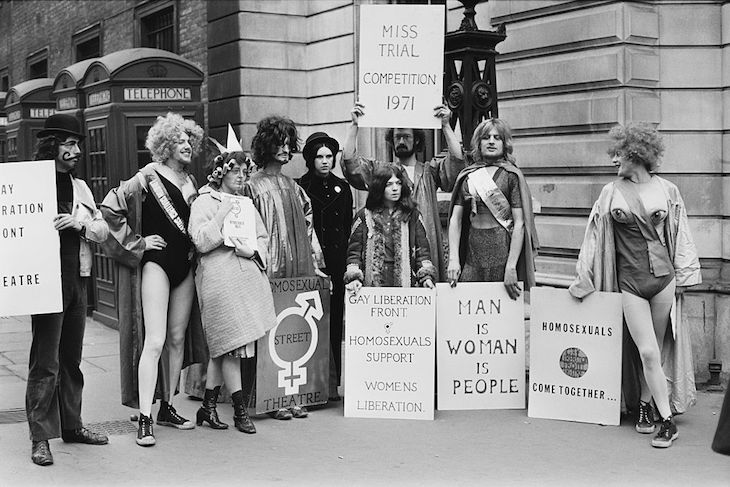It’s exactly 50 years since the Sexual Offences Act, which partially decriminalised male homosexuality, received the Royal Assent on 27 July 1967 after an impassioned late-night debate in the Commons. I wish I could say — death of Kennedy-like — that I remember where I was. But I don’t.
I had only one concern that summer. It was to get the First which would enable me to return to Cambridge to study for my PhD in Tudor history under Geoffrey Elton. The goal achieved, I relaxed like a spent fish.
But I did do one thing that mattered. I lost weight and changed from a fat and frumpy teenager into a svelte and rather fetching young man.
Which stood me in good stead for the next milestone in gay history.
Homosexuals were expected to be grateful for the ’67 act — and to show their gratitude by staying discreetly in their semi-legalised closet. Or as Lord Arran, the sponsor of the bill in the Lords, put it: ‘I ask those [homosexuals] to show their thanks by comporting themselves quietly and with dignity… any form of ostentatious behaviour now or in the future or any form of public flaunting would be utterly distasteful.’
‘Public flaunting’ was, however, the whole point of the Gay Liberation Front. Founded in America in the wake of the Stonewall riots of 1969, its message quickly spread to this side of the Atlantic, where it spawned a whole series of organisations and influenced many more. Its best slogan — for gay politics had not yet lost a sense of humour—was ‘better blatant than latent’. I loved it and have tried to live it.
And this time I remember, for I was there. I’d moved from Cambridge to the London School of Economics in the academic year 1972-3 and found myself in the thick of it.
There was the British GLF, which held its first meeting in the basement at LSE in 1970 (basements, as Matthew Parris has observed, were very important in gay life). There was also the Campaign for Homosexual Equality, founded in Manchester in 1971. Sometimes the two organisations were bitter rivals and sometimes the best of friends and they effectively fused at the CHE Conference at Great Malvern in 1974.
I was there, too. We trained up from London in a posse and our strident conversation scandalised the other passengers who, led by a stout and formidable woman, asked us to pipe down. I fear — blatantly as ever — we continued, and at an even higher volume.
I squirm a little at the memory. But my shame is reserved for inflicting ‘coming out’ on my poor, uncomprehending mother. It poisoned both our relationship and her few remaining years. Yet, even at this distance of time and despite all the pain it caused, I still think it was the right thing to do. It was the final statement that I would be the person I wanted to be, and not the one she wanted me to be. But it was tragic in the proper, Hegelian sense of the word, as a clash of two views of right and wrong.
At the end of the 1970s, I came out as a Tory as suddenly and completely as I’d come out as gay. And a decade later, I combined the two when Peter Campbell, who had founded the Conservative Group for Homosexual Equality in 1975, asked me to take over the organisation. We stepped out of the closet (and the basement) and relaunched at the party conference in 1991 in a modest glare of publicity. We cheekily renamed ourselves TORCHE (Tory Campaign for Homosexual Equality) and gave the Party’s then emblem of a flaming torch a camp fillip. We were stuffed with thrusting PR boys and lobbyists and played a significant part in the Major government’s attempt to equalise the age of consent for straight and gay sex at 16.
But we were defeated by an unholy alliance of left- and right-wing parliamentarians. Prominent among the latter was that well-known moralist Jeffrey Archer. We faced each other on Question Time. He spoke passionately in favour of the compromise higher age of consent for gay sex of 18 to protect vulnerable young men like his sons. I replied that it was clear that Englishmen sat on the fence so much because they enjoyed the sensation.
He went puce. Blatant rather than latent had won again.
So where does this leave Justine Greening’s recent announcement — deliberately timed to coincide with the anniversary of the ’67 act — that the government hopes to make gender reassignment a simple matter of statutory self-declaration with none of the ‘demeaning’ bother of medical assessment? Is it, as she claims, part of a properly conservative long march? Hardly. We fought, as conservatives should, for the recognition of facts. On the other hand, Greening and her sidekick Nick Gibb believe in defying them, since they appear to deny that gender is based in biology.
Many others have pointed out the formidable practical difficulties in the way of such an approach. I would like to highlight the philosophical ones. For to believe that wanting makes it so — in this instance that a man can become a woman or vice versa simply by willing it — is a characteristically left-wing position. It is the origin of the magic money tree, of the triumph of opinion over fact in education.
For supposedly conservative ministers explicitly to espouse the doctrine is the last straw. The subtext of so-called Tory modernisation has always been that the left is really right. This admits it.
But what else do you expect from a government led by a woman who called her own party ‘nasty’?






Comments